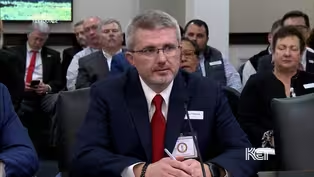
VR and Eating Disorders
Clip: Season 3 Episode 57 | 3m 55sVideo has Closed Captions
Virtual Reality used to treat eating disorders.
Researchers at the University of Louisville using virtual reality to treat patients with eating disorders.
Problems playing video? | Closed Captioning Feedback
Problems playing video? | Closed Captioning Feedback
Kentucky Edition is a local public television program presented by KET

VR and Eating Disorders
Clip: Season 3 Episode 57 | 3m 55sVideo has Closed Captions
Researchers at the University of Louisville using virtual reality to treat patients with eating disorders.
Problems playing video? | Closed Captioning Feedback
How to Watch Kentucky Edition
Kentucky Edition is available to stream on pbs.org and the free PBS App, available on iPhone, Apple TV, Android TV, Android smartphones, Amazon Fire TV, Amazon Fire Tablet, Roku, Samsung Smart TV, and Vizio.
Providing Support for PBS.org
Learn Moreabout PBS online sponsorshipEating disorders affect almost 30 million Americans.
And researchers at the University of Louisville have a creative prevention tool by letting patients face their fears and anxieties with virtual reality.
There's more in tonight's medical news.
Eating disorders are psychiatric disorders.
They're very serious.
They take a life every 52 minutes and Kentucky alone, there will be 400,000 individuals that will have an eating disorder in their lifetime.
And it's it's extremely serious.
And it's the second killer of all psychiatric illnesses.
It's getting way worse, which is very serious.
And treatments aren't very effective for most people, especially with adults.
There are options, but they only work for about 50% or less of the people that have access to them and seek that treatment.
We saw that in anxiety treatments that people were using exposures and so exposures are facing your fears systematically instead of running from them.
We're developing different modules within the VR headset that can be used with their clinician or also as homework or hopefully with people that don't have access to care or on waiting lists.
So they put on the goggles and then they choose their body color and their hair color and they make an avatar that is is them and that they that they feel looks like them.
And then they're systematically experiencing if it's fear of weight gain, they're systematically experiencing that weight gain and they're moving in their body and they can look down on their body and see that their body is changing and they can process the different fears and how it might feel to dress that body and all of the different things that come along with that.
It's very intense and it's very dramatic and as they keep it keeps getting worse and worse and worse, but their anxiety starts to come down and and that starts to train them that, oh, yeah, either that was terrible, but I handled it or or, you know, that wasn't as bad as I thought.
Or maybe that was as bad as I thought.
But I'm I'm okay.
And so then during the week, they're eating disorder behaviors will also start to diminish because the fear is gone.
So that root, if you can attack that route and start to face the fears and not avoid them, then the fear, the theory is that they're eating disorder behaviors will also go with it.
Their perception may or may not be accurate, right?
So they could look in the mirror and they might see a very different body than most of the other people looking at them.
But they are going to develop their body and what they think.
And then it's going to kind of go from there to be very personalized.
So people were very shocked at how real it was for them.
What we want to do and what we're working on is personalizing treatment and making it really accessible to all types of people because eating disorders do not affect a certain type of person.
Eating disorders affect everyone.
According to Dr. Christina Ralph Millman, about 700 Kentuckians per year need emergency room treatment for eating disorders.
pre-COVID.
Since the pandemic, that number has nearly doubled.
FCPS Gets Pushback on School Bathroom Designs
Video has Closed Captions
Clip: S3 Ep57 | 3m 16s | Lawmakers: Middle School bathroom design defies state law. (3m 16s)
Governor Andy Beshear Speaks at DNC
Video has Closed Captions
Clip: S3 Ep57 | 4m 54s | Governor Andy Beshear focuses on reproductive rights at the Democratic National Convention. (4m 54s)
Headlines Around Kentucky (8/20/2024)
Video has Closed Captions
Clip: S3 Ep57 | 4m 7s | A look at stories making headlines around the state. (4m 7s)
Video has Closed Captions
Clip: S3 Ep57 | 2m 55s | Sister Cities program fosters diplomacy. (2m 55s)
New Education Commissioner Lays Out Top Priorities
Video has Closed Captions
Clip: S3 Ep57 | 4m 20s | Robbie Fletcher says his first priority is to build relationships. (4m 20s)
Providing Support for PBS.org
Learn Moreabout PBS online sponsorship
- News and Public Affairs

Top journalists deliver compelling original analysis of the hour's headlines.

- News and Public Affairs

FRONTLINE is investigative journalism that questions, explains and changes our world.












Support for PBS provided by:
Kentucky Edition is a local public television program presented by KET




